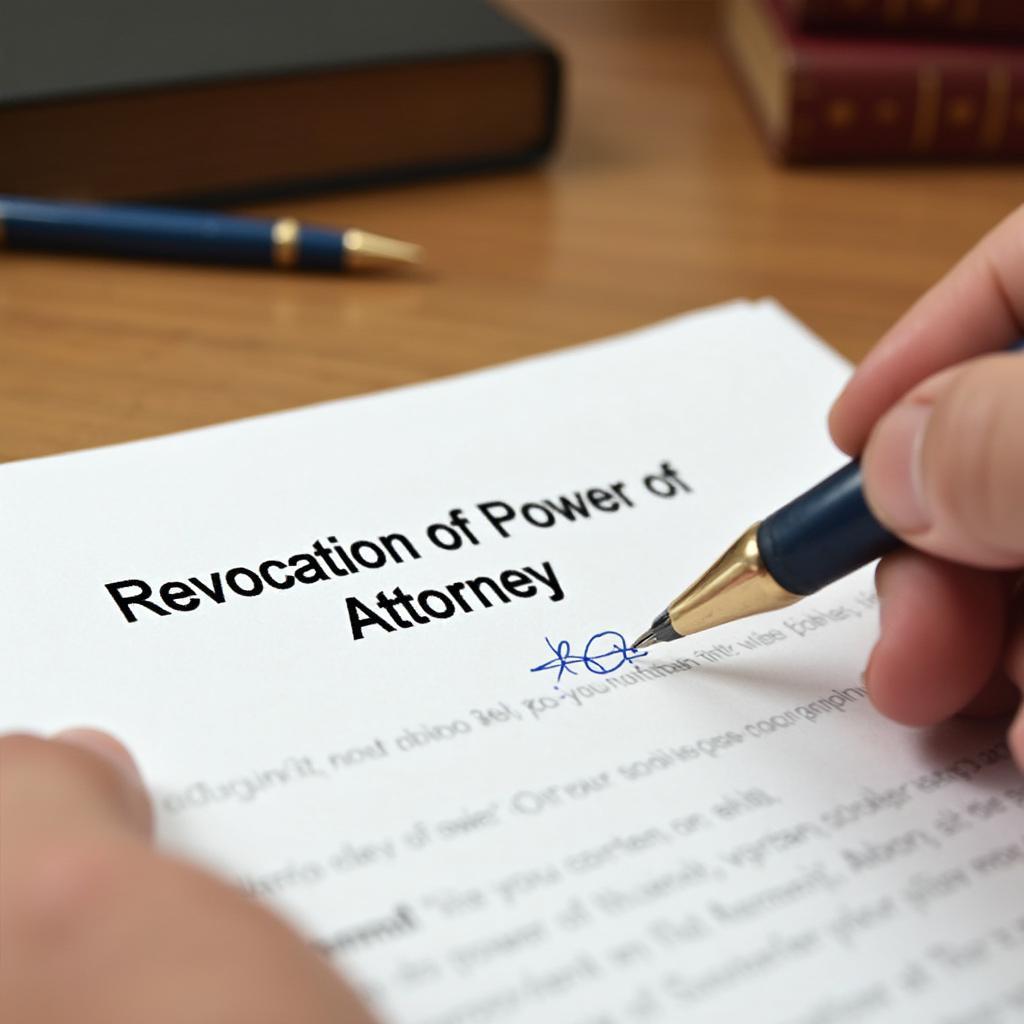
How to Remove Power of Attorney From Someone
Revoking a power of attorney is a crucial legal process, ensuring you maintain control over your affairs. Whether due to changing circumstances, a breach of trust, or simply peace of mind, understanding how to remove someone’s power of attorney is essential. This article provides a comprehensive guide to navigating this process, outlining the necessary steps and considerations.
What are the steps to revoke a power of attorney? First, you must create a revocation document. This document formally states your intention to revoke the power of attorney. Next, you must notify the agent, the individual who holds the power of attorney. Finally, it’s highly recommended to notify any institutions where the power of attorney is in effect, such as banks and healthcare providers. This ensures your wishes are respected and avoids any potential complications.  Revoking Power of Attorney Document
Revoking Power of Attorney Document
Understanding the Different Types of Power of Attorney
Before initiating the revocation process, it’s important to understand the type of power of attorney you have granted. A durable power of attorney remains in effect even if you become incapacitated, while a non-durable power of attorney terminates if you lose mental capacity. This distinction impacts the revocation process, particularly if you’re revoking due to incapacity concerns. how to remove someone from power of attorney Similarly, understanding the scope of the power of attorney—whether it’s limited to specific matters or grants broad authority—is also important.
Creating a Revocation Document
The revocation document must be in writing, clearly stating your intent to revoke the power of attorney. It should identify the original power of attorney document by date and parties involved. The document must also be signed and dated by you, the principal, and ideally notarized to ensure its legality and prevent challenges.  Notarized Revocation of Power of Attorney
Notarized Revocation of Power of Attorney
Notifying the Agent and Relevant Institutions
Once the revocation document is executed, you must notify the former agent in writing, providing them with a copy of the revocation. This officially informs them that their authority is terminated. Additionally, notify all relevant institutions, such as banks, financial institutions, and healthcare providers, where the power of attorney was used. This prevents the former agent from acting on your behalf after the revocation. can my power of attorney live in another country This is especially crucial if the agent is living abroad.
When Should You Consider Removing Someone’s Power of Attorney?
Several situations warrant revoking a power of attorney. Suspected misuse or abuse of power, a change in your relationship with the agent, or simply wanting to reassess your arrangements are all valid reasons. Even if there are no immediate concerns, regularly reviewing your power of attorney arrangements is a good practice.
Legal Assistance and State-Specific Regulations
While you can revoke a power of attorney yourself, consulting with an attorney is highly recommended. They can ensure the revocation document is legally sound and compliant with your state’s specific requirements. Laws governing power of attorney vary by jurisdiction, so seeking legal advice tailored to your location is essential. does a conservatorship override a power of attorney It’s important to understand how conservatorship interacts with power of attorney in your state.
How do I revoke a power of attorney in California?
California, like other states, has specific requirements for revoking a power of attorney. It’s crucial to adhere to these regulations to ensure the revocation is legally valid. Consulting with a California attorney specializing in estate planning is recommended. attorney in fact california Understanding the role and responsibilities of an attorney-in-fact in California is also critical.
“Ensuring a smooth transition of power is essential when revoking a power of attorney,” says Le Thi Thanh Huong, a seasoned estate planning attorney in Ho Chi Minh City. “Careful documentation and communication can prevent future disputes and protect your interests.”
What if the agent refuses to acknowledge the revocation?
If the agent refuses to acknowledge the revocation, seeking legal intervention might be necessary. A court order can enforce the revocation and protect your rights. Documenting all communication attempts with the agent is important in such cases. does a power of attorney get paid Understanding the financial implications of power of attorney, including whether the agent is compensated, can also be relevant.
“Proactive communication with financial institutions and other relevant parties can prevent potential complications arising from a revoked power of attorney,” adds Nguyen Van Duc, a legal expert in Hanoi. “This ensures your wishes are respected and avoids any unauthorized actions by the former agent.”
In conclusion, revoking a power of attorney is a significant legal action that requires careful consideration and proper execution. Understanding the process, ensuring compliance with state-specific regulations, and seeking legal counsel when needed are crucial steps to protecting your interests and maintaining control over your affairs. Knowing how to remove power of attorney from someone empowers you to manage your legal arrangements effectively.
FAQ
-
What is a power of attorney? A power of attorney is a legal document that authorizes someone to act on your behalf.
-
Can I revoke a power of attorney at any time? Generally, yes, unless the power of attorney is durable and you are incapacitated.
-
Do I need a lawyer to revoke a power of attorney? While not always required, consulting a lawyer is highly recommended.
-
What happens if my agent doesn’t comply with the revocation? You may need to seek legal intervention to enforce the revocation.
-
How long does it take to revoke a power of attorney? The time varies depending on the jurisdiction and the complexity of the situation.
-
What should I do after revoking a power of attorney? Notify all relevant institutions and parties who were aware of the original power of attorney.
-
Where can I find more information about power of attorney laws in my state? Consult your state’s bar association or seek legal advice from a qualified attorney.





